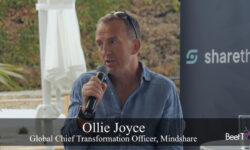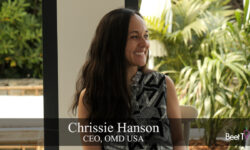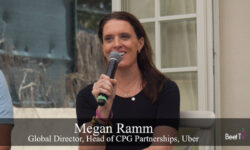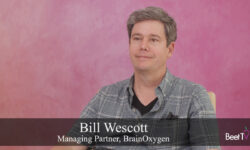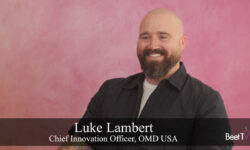CANNES — In an era where sustainability is not just an option but a necessity, businesses are grappling with how to reduce their carbon footprints – without compromising on performance.
In this video interview with Mike Shields for Beet.TV, Kaitlin Leary, Head of Global Agency & Brand Partnerships at Scope3, a media decarbonization company, sheds light on the issue.
From Awareness to Action
“Scope3 is a media decarbonization company … focused on reduction of carbon emissions in the digital ecosystem,” Leary says.
For many companies, the focus has now shifted from simply understanding the problem to implementing solutions.
Leary emphasizes the correlation between carbon and quality media, stating that “low carbon correlates with high quality media across a bunch of different metrics and high carbon kind of correlates with waste”.
This insight is key in debunking misconceptions that sustainability equates to higher costs or lower quality,” Leary claims.
The Business Case for Decarbonization
While Scope3, led by AppNexus founder Brian O’Kelley, is a company aiming to be “source of truth for supply chain emissions data”, Scope 3 is a class of emissions that are incurred from companies’ indirect, downstream activities.
Leary and her team have been hard at work proving the business case for decarbonization. “This year it’s been about really putting people’s money where their mouth is and testing,” she says.
The results have been promising; an extensive study conducted with the World Federation of Advertisers (WFA) and several brands found that reducing carbon emissions either had no impact on the campaign results or, in many cases, a positive one.
Leary explains further: “Attention, ECPM, video completion, click-through sales – they all had either minimal effect to the campaign or positive, which is amazing.”
This suggests that sustainability and performance are not mutually exclusive but can coexist harmoniously.
@Scope3data launches today with the vision of a decarbonized digital future. Read more at https://t.co/ZYR8Vwaexa#NetZero #sustainableadvertising #ESG #CSR #carbonemissions @bokelley
— Scope3 (@Scope3data) January 26, 2022
Overcoming Obstacles and Gaining Traction
When asked about the initial obstacles and traction points, Leary acknowledges the importance of having a sustainability advocate within an organization. She is pleasantly surprised to note that these advocates can be found both at the agency and brand levels.
However, she also recognizes the challenges that sustainability presents. “People hear sustainability, they can’t define it, they don’t know what it means,” she notes. There’s work to be done in helping people understand the correlation between carbon and performance so they don’t fear their campaign will falter if they opt to optimize towards carbon.
Taking Actions for a Sustainable Future
Looking ahead, Leary’s vision of success is simple yet profound.
“What I expect of us and our partners is creating tools that make it easy for clients and their agencies to reduce carbon emissions and measure carbon emissions,” she says.
This ‘easy button’ approach aims to streamline the process of sustainability, making it not just a viable option but an effortless one.
Leary also calls on marketers to drive change. “Your job should be to make more people care about sustainability,” she says. “Progress over perfection take steps. And I hope some of the world’s biggest marketers next year say ‘Here’s what we learned… and here’s what we’re doing next’.”











